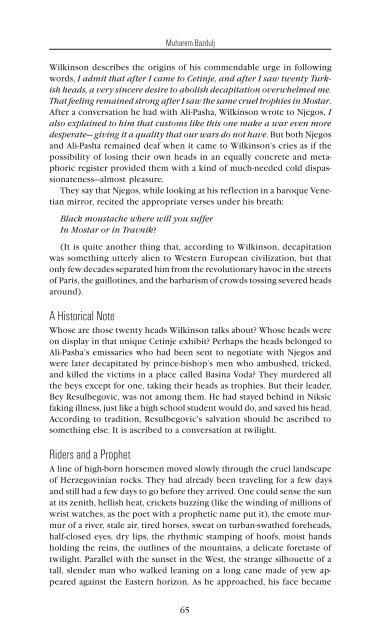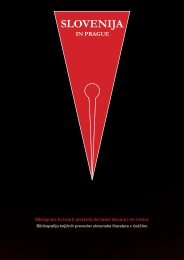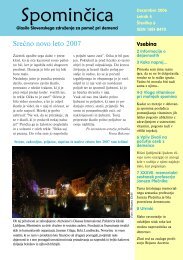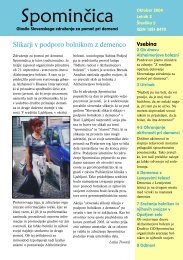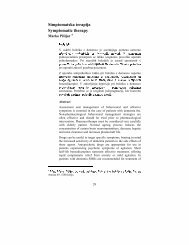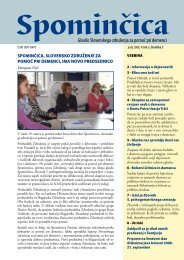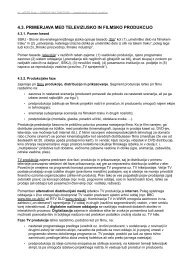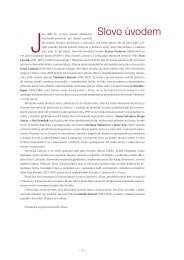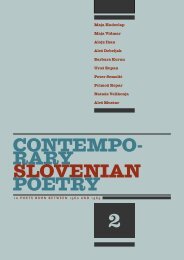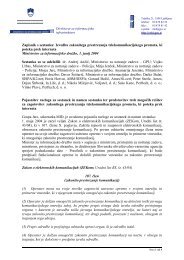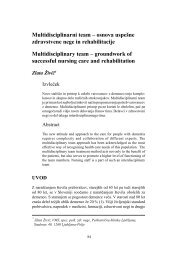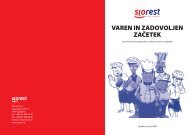- Page 1 and 2:
Avtorji v tej knjigi so predstavlje
- Page 3 and 4:
KAZALO / CONTENT Nagrajenka Vilenic
- Page 5 and 6:
Brigitte Kronauer 5
- Page 7 and 8:
Brigitte Kronauer Brigitte Kronauer
- Page 9 and 10:
Brigitte Kronauer Werke (Auswahl):
- Page 11 and 12:
Brigitte Kronauer Vilenica-Preistr
- Page 13 and 14: Brigitte Kronauer verhaltener Ironi
- Page 15 and 16: Brigitte Kronauer ungewöhnlichen B
- Page 17 and 18: Brigitte Kronauer nach dem Herstell
- Page 19 and 20: Brigitte Kronauer Der Störenfried
- Page 21 and 22: Brigitte Kronauer Bekannten oder so
- Page 23 and 24: Brigitte Kronauer Da hatte er’s:
- Page 25 and 26: Brigitte Kronauer Böser Knopf Für
- Page 27 and 28: Brigitte Kronauer so benutzen«, ka
- Page 29 and 30: Brigitte Kronauer ten seiner Zähne
- Page 31 and 32: Brigitte Kronauer Junger Mann, dumm
- Page 33 and 34: Brigitte Kronauer Seiten weisgemach
- Page 35 and 36: Brigitte Kronauer das Angeschaute d
- Page 37 and 38: Die Frau in den Kissen Brigitte Kro
- Page 39 and 40: Brigitte Kronauer waren fast einzel
- Page 41 and 42: Brigitte Kronauer mit Vergnügen na
- Page 43 and 44: Brigitte Kronauer gemeinsam mit ihr
- Page 45 and 46: Brigitte Kronauer Die Wiese »Ich k
- Page 47 and 48: Brigitte Kronauer ich nicht mehr da
- Page 49 and 50: Jan Balabán 49
- Page 51 and 52: Jan Balaban Proměny Doktor Satinsk
- Page 53 and 54: Jan Balaban byl přece popsaný pro
- Page 55 and 56: Muharem Bazdulj 55
- Page 57 and 58: Muharem Bazdulj Susret u sumraku Dv
- Page 59 and 60: Muharem Bazdulj nemaju. No Njegoš
- Page 61 and 62: Muharem Bazdulj Dramatično predska
- Page 63: Muharem Bazdulj u onom izaslanstvu
- Page 67 and 68: Muharem Bazdulj Yin replaces Yang -
- Page 69 and 70: Muharem Bazdulj 69
- Page 71 and 72: Eric Brogniet 71
- Page 73 and 74: Eric Brogniet La passagere è L’a
- Page 75 and 76: Eric Brogniet Parce que du fond du
- Page 77 and 78: Eric Brogniet Où le son Revenant p
- Page 79 and 80: Eric Brogniet Comme une pureté Une
- Page 81 and 82: Eric Brogniet Une lettre en contien
- Page 83 and 84: Ştefan Caraman 83
- Page 85 and 86: Ştefan Caraman Ceauşescu My Love
- Page 87 and 88: Stau la coadă la puii înghețați
- Page 89 and 90: Ştefan Caraman Elena este cea mai
- Page 91 and 92: Ştefan Caraman You are a cynic so
- Page 93 and 94: Ştefan Caraman Elena is the best p
- Page 95 and 96: Daša Drndić 95
- Page 97 and 98: Daša Drndić Leica format odlomak
- Page 99 and 100: Daša Drndić se točno koliko, kol
- Page 101 and 102: Daša Drndić U zimskim noćima ost
- Page 103 and 104: Daša Drndić najveću i najmoderni
- Page 105 and 106: Daša Drndić svim krevetima na tom
- Page 107 and 108: Daša Drndić Posljednja žrtva pom
- Page 109 and 110: Daša Drndić in an existing hospit
- Page 111 and 112: Daša Drndić a day. My sister died
- Page 113 and 114: Daša Drndić were soaked with rain
- Page 115 and 116:
Martin Fahrner 115
- Page 117 and 118:
Martin Fahrner Němá barikáda Mě
- Page 119 and 120:
Martin Fahrner Přijel jsem před h
- Page 121 and 122:
Martin Fahrner Muže na barikádě
- Page 123 and 124:
one else’s bicycle there, yet the
- Page 125 and 126:
125
- Page 127 and 128:
Edward Foster 127
- Page 129 and 130:
Dry Landscapes in Cezanne A long ti
- Page 131 and 132:
The Puritan from Blachernae (Mehmet
- Page 133 and 134:
Edward Foster Morning Done with try
- Page 135 and 136:
Edward Foster Breaking the Stream L
- Page 137 and 138:
Georgi Gospodinov 137
- Page 139 and 140:
Georgi Gospodinov Íîâèíè Òÿ
- Page 141 and 142:
Georgi Gospodinov Éîàí Íàãà
- Page 143 and 144:
Georgi Gospodinov Èç »Åñòåñ
- Page 145 and 146:
Georgi Gospodinov Èñòîðèÿ ñ
- Page 147 and 148:
Georgi Gospodinov The love rabbit I
- Page 149 and 150:
From »Natural Novel« Georgi Gospo
- Page 151 and 152:
Georgi Gospodinov 151
- Page 153 and 154:
Gintaras Grajauskas 153
- Page 155 and 156:
Gintaras Grajauskas Tai jis tai jis
- Page 157 and 158:
Gintaras Grajauskas Kineskopas tas
- Page 159 and 160:
Dievo dažnis yra 50 Hz sëdëjo ki
- Page 161 and 162:
Gintaras Grajauskas statau barikad
- Page 163 and 164:
Gintaras Grajauskas Bildröhre das
- Page 165 and 166:
Gintaras Grajauskas ich baue eine B
- Page 167 and 168:
Daniela Kapitáňová 167
- Page 169 and 170:
Daniela Kapitáňová Höfferling,
- Page 171 and 172:
Daniela Kapitáňová pauzu. Tvrdá
- Page 173 and 174:
Daniela Kapitáňová To je všetko
- Page 175 and 176:
Daniela Kapitáňová hinkte schrec
- Page 177 and 178:
Daniela Kapitáňová 177
- Page 179 and 180:
Vojislav Karanović 179
- Page 181 and 182:
Vojislav Karanović Razglednica Jes
- Page 183 and 184:
Elegija o bagremu pod prozorom 1. K
- Page 185 and 186:
Vojislav Karanović ali drvo gleda
- Page 187 and 188:
Vojislav Karanović Pored prozora N
- Page 189 and 190:
Elegy About an Acacia Under the Win
- Page 191 and 192:
Vojislav Karanović By the Window S
- Page 193 and 194:
Artjom Kavalevski 193
- Page 195 and 196:
Artjom Kavalevski Íà õâàñöå
- Page 197 and 198:
Artjom Kavalevski Ðàòàöûÿ ä
- Page 199 and 200:
Artjom Kavalevski dzìîâû â³
- Page 201 and 202:
Artjom Kavalevski Sleeping beauty
- Page 203 and 204:
Rotation for Yuri Gagarin Artjom Ka
- Page 205 and 206:
Artjom Kavalevski Sleeping Beauty L
- Page 207 and 208:
Juris Kronbergs 207
- Page 209 and 210:
Juris Kronbergs Septini ț dzejoli
- Page 211 and 212:
Vilks vienacis mainijies Viòš jut
- Page 213 and 214:
Juris Kronbergs Vilks vienacis doma
- Page 215 and 216:
Vilka vienača ziemas lűgšana Râ
- Page 217 and 218:
Vilks vienacis neskaidriba Laiks ie
- Page 219 and 220:
Vilks vienacis pavasari Plaukstoši
- Page 221 and 222:
Juris Kronbergs Wolf One-Eye Has Ch
- Page 223 and 224:
Juris Kronbergs Wolf One-Eye’s Wi
- Page 225 and 226:
Wolf One-Eye in Spring Leafing tree
- Page 227 and 228:
Alain Lance 227
- Page 229 and 230:
Alain Lance L’espoir ? Il est enc
- Page 231 and 232:
Alain Lance Epitaphe Hurla en naiss
- Page 233 and 234:
Alain Lance Il y aurait donc Cinq c
- Page 235 and 236:
Sydney Lea 235
- Page 237 and 238:
Sydney Lea Yoked Together The warde
- Page 239 and 240:
Sydney Lea I imagined using, precis
- Page 241 and 242:
Sydney Lea Wife-Tracking Men and wo
- Page 243 and 244:
Sydney Lea Authority The times were
- Page 245 and 246:
Sydney Lea Outside, we recall how w
- Page 247 and 248:
Vasyl Makhno 247
- Page 249 and 250:
Îêåàí ñåí-æîí ïåðñà
- Page 251 and 252:
Vasyl Makhno ïîâñþäè îêå
- Page 253 and 254:
Ó ïèâíîìó áàð³ »GOSSER
- Page 255 and 256:
Vasyl Makhno Åëåã³ÿ âîäè
- Page 257 and 258:
Vasyl Makhno the ocean is all aroun
- Page 259 and 260:
Vasyl Makhno Elegy of water Every r
- Page 261 and 262:
Katarina Marinčič 261
- Page 263 and 264:
The Etruscan Vel Matuna excerpt fro
- Page 265 and 266:
Katarina Marinčič The smooth trun
- Page 267 and 268:
Katarina Marinčič Then he dressed
- Page 269 and 270:
Txema Martínez Inglés 269
- Page 271 and 272:
Txema Martínez Inglés La vida El
- Page 273 and 274:
Txema Martínez Inglés Matins Hi h
- Page 275 and 276:
Txema Martínez Inglés Després de
- Page 277 and 278:
Txema Martínez Inglés El cor de C
- Page 279 and 280:
Txema Martínez Inglés Fins i tot
- Page 281 and 282:
Txema Martínez Inglés Even when I
- Page 283 and 284:
Valžina Mort 283
- Page 285 and 286:
Valžina Mort Êàá óâàéñö³
- Page 287 and 288:
Valžina Mort Áîëüí³öà Êà
- Page 289 and 290:
Valžina Mort ³ áûööàì áû
- Page 291 and 292:
Valžina Mort Íå ïðûõ³íàö
- Page 293 and 294:
Valžina Mort A Hospital If you kee
- Page 295 and 296:
Valžina Mort Do not lean against t
- Page 297 and 298:
Novica Novaković 297
- Page 299 and 300:
Novica Novaković Angel Fall I drea
- Page 301 and 302:
Novica Novaković Some Day Some day
- Page 303 and 304:
Novica Novaković That Night That n
- Page 305 and 306:
Novica Novaković Headless Horsemen
- Page 307 and 308:
Gino Pastega 307
- Page 309 and 310:
Gino Pastega Straniero Uomo, strani
- Page 311 and 312:
Che cosa faro’ quando Gino Pasteg
- Page 313 and 314:
Gino Pastega Il poeta La morte vera
- Page 315 and 316:
Gino Pastega Di porpora e sangue Di
- Page 317 and 318:
Szilárd Podmaniczky 317
- Page 319 and 320:
Happy birthday to you! Szilárd Pod
- Page 321 and 322:
Szilárd Podmaniczky A hely ismeret
- Page 323 and 324:
Szilárd Podmaniczky konyhaszekrén
- Page 325 and 326:
Szilárd Podmaniczky Csak itt állt
- Page 327 and 328:
Szilárd Podmaniczky másnaposságo
- Page 329 and 330:
Szilárd Podmaniczky 329
- Page 331 and 332:
Szilárd Podmaniczky though some cr
- Page 333 and 334:
Szilárd Podmaniczky hand I had but
- Page 335 and 336:
Szilárd Podmaniczky to pay for my
- Page 337 and 338:
Szilárd Podmaniczky down the bank;
- Page 339 and 340:
Aleksandar Prokopiev 339
- Page 341 and 342:
Aleksandar Prokopiev ÊÀÁÈÍÈ
- Page 343 and 344:
Aleksandar Prokopiev - Ñèãóðí
- Page 345 and 346:
Aleksandar Prokopiev Four oxfordshi
- Page 347 and 348:
Aleksandar Prokopiev 3. I don’t l
- Page 349 and 350:
Aleksandar Prokopiev front of him,
- Page 351 and 352:
Aleksandar Prokopiev III I don’t
- Page 353 and 354:
Barbara Simoniti 353
- Page 355 and 356:
Barbara Simoniti The Way Back I ste
- Page 357 and 358:
Barbara Simoniti My lawyer, Primož
- Page 359 and 360:
Barbara Simoniti I could not sleep.
- Page 361 and 362:
Barbara Simoniti I got up from the
- Page 363 and 364:
Barbara Simoniti »The house is not
- Page 365 and 366:
Peter Steiner 365
- Page 367 and 368:
Peter Steiner Wo immer du willst
- Page 369 and 370:
Peter Steiner bei sich zuhause aufn
- Page 371 and 372:
Peter Steiner Gestaltung geplant un
- Page 373 and 374:
Anni Sumari 373
- Page 375 and 376:
Anni Sumari Omaelämäkerta Ilman v
- Page 377 and 378:
Anni Sumari Välähdys sinitaivaast
- Page 379 and 380:
Anni Sumari En voi uskoa silmiäni,
- Page 381 and 382:
Anni Sumari Jauhelihaa. Me olemme k
- Page 383 and 384:
Anni Sumari A glimpse of the blue s
- Page 385 and 386:
Anni Sumari Ground beef. We are all
- Page 387 and 388:
Vladamir P. Štefanec 387
- Page 389 and 390:
Vladamir P. Štefanec The Unicorn F
- Page 391 and 392:
Vladamir P. Štefanec to its former
- Page 393 and 394:
Vladamir P. Štefanec does winter s
- Page 395 and 396:
Vladamir P. Štefanec which, only m
- Page 397 and 398:
Cai Tianxin 397
- Page 399 and 400:
Cai Tianxin 399
- Page 401 and 402:
Cai Tianxin 401
- Page 403 and 404:
Cai Tianxin 403
- Page 405 and 406:
Cai Tianxin 405
- Page 407 and 408:
Cai Tianxin Niagara Falls Above the
- Page 409 and 410:
Cai Tianxin Sunlight The sun is a m
- Page 411 and 412:
Krzysztof Varga 411
- Page 413 and 414:
Krzysztof Varga Karolina Nie podró
- Page 415 and 416:
Krzysztof Varga włoskich muzeach,
- Page 417 and 418:
Krzysztof Varga lody miętowe przyw
- Page 419 and 420:
Krzysztof Varga factories in indust
- Page 421 and 422:
Krzysztof Varga 421
- Page 423 and 424:
Peter Weber 423
- Page 425 and 426:
Peter Weber Die Halle Aus: Bahnhofs
- Page 427 and 428:
Peter Weber verpflichten. Sie arbei
- Page 429 and 430:
Andrea Zanzotto 429
- Page 431 and 432:
Andrea Zanzotto Riflesso Spesso nel
- Page 433 and 434:
13 Settembre 1959 (variante) Luna p
- Page 435 and 436:
Andrea Zanzotto Al mondo Mondo, sii
- Page 437 and 438:
Andrea Zanzotto Idea E tutte le cos
- Page 439 and 440:
PREVAJALSKA DELAVNICA POETRY TRANSL
- Page 441 and 442:
Mererid Puw Davies 441
- Page 443 and 444:
Mae’r cyfrifiadur hefyd yn fardd
- Page 445 and 446:
Mererid Puw Davies dros apéritif t
- Page 447 and 448:
Mererid Puw Davies Over a drink Com
- Page 449 and 450:
Louis de Paor 449
- Page 451 and 452:
Louis de Paor Sméara Dubha Más bu
- Page 453 and 454:
Louis de Paor kot rjuha in on, on,
- Page 455 and 456:
Louis de Paor The Singer These two
- Page 457 and 458:
Louis de Paor 457
- Page 459 and 460:
Helena Sinervo 459
- Page 461 and 462:
Helena Sinervo Teiresiaan nautinto
- Page 463 and 464:
Helena Sinervo Ikävöivän jakeet
- Page 465 and 466:
The Pining One’s Verses Helena Si
- Page 467 and 468:
MLADA VILENICA 467
- Page 469 and 470:
Mlada Vilenica Eva Rener, a pupil o
- Page 471 and 472:
DOSEDANJI UDELEŽENCI IN NAGRAJENCI
- Page 473 and 474:
Dosedanji udeleženci in nagrajenci
- Page 475 and 476:
Dosedanji udeleženci in nagrajenci
- Page 477 and 478:
Dosedanji udeleženci in nagrajenci
- Page 479 and 480:
Dosedanji udeleženci in nagrajenci
- Page 481:
KONZULTANTI / CONSULTANTS EVGEN BAV


